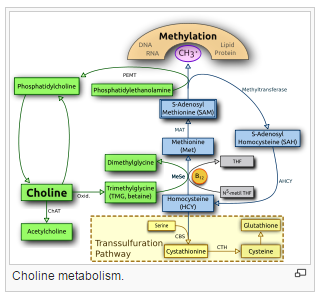Choline
|
WikiDoc Resources for Choline |
|
Articles |
|---|
|
Most recent articles on Choline |
|
Media |
|
Evidence Based Medicine |
|
Clinical Trials |
|
Ongoing Trials on Choline at Clinical Trials.gov Clinical Trials on Choline at Google
|
|
Guidelines / Policies / Govt |
|
US National Guidelines Clearinghouse on Choline
|
|
Books |
|
News |
|
Commentary |
|
Definitions |
|
Patient Resources / Community |
|
Directions to Hospitals Treating Choline Risk calculators and risk factors for Choline
|
|
Healthcare Provider Resources |
|
Causes & Risk Factors for Choline |
|
Continuing Medical Education (CME) |
|
International |
|
|
|
Business |
|
Experimental / Informatics |
Editor-In-Chief: C. Michael Gibson, M.S., M.D. [1]
Overview
Choline is an organic compound, classified as an essential nutrient[1][2][3] and usually grouped within the Vitamin B complex. This natural amine is found in the lipids that make up cell membranes and in the neurotransmitter acetylcholine. Adequate intakes (AI) for this micronutrient of between 425 to 550 milligrams daily, for adults, have been established by the Food and Nutrition Board of the Institute of Medicine of the National Academy of Sciences.
History
Choline was discovered by Andreas Strecker in 1864 and chemically synthesized in 1866. In 1998 choline was classified as an essential nutrient by the Food and Nutrition Board of the Institute of Medicine (U.S.A.).
Chemistry
Choline is a quaternary saturated amine with the chemical formula: (CH3)3N+CH2CH2OHX−. where X− is a counterion such as chloride (see choline chloride), hydroxide or tartrate.
Physiology

Choline and its metabolites are needed for three main physiological purposes: structural integrity and signaling roles for cell membranes, cholinergic neurotransmission (acetylcholine synthesis), and as a major source for methyl groups via its metabolite, trimethylglycine (betaine) that participates in the S-adenosylmethionine synthesis pathways.
When choline is metabolized by the body, it may form trimethylamine, a compound with a fishy odor. Hence, when large amounts of choline are taken the person may suffer from a fishy body odor.
Choline as a supplement
It is well established that supplements of methyl group transfer vitamins B6, B12, folic acid reduce the blood titer of homocysteine and prevent heart disease. Choline is a necessary source of methyl groups for methyl group transfer. Supplements of lecithin/choline by Central Soya scientists reduced heart disease in laboratory studies. The reduction in heart disease with lecithin supplements may however relate more to the cholesterol carrying capacity of lecithin than to the methyl group transfer role of choline.Template:Specify
Choline supplements are often taken as a form of 'smart drug' or nootropic, due to the the role that the neurotransmitter acetylcholine plays in various cognition systems within the brain. Choline is a chemical precursor or "building block" needed to produce the neurotransmitter acetylcholine, and research suggests that memory, intelligence and mood are mediated at least in part by acetylcholine metabolism in the brain. The efficacy, benefits and negative side effects of these supplements is a topic of continuing debate; research in the New England Journal of Medicine[citation needed] has suggested that choline supplements could have a detrimental effect on individuals who suffer from clinical depression or bipolar disorder, who seem to be hypersensitive to acetylcholine.
The Food and Drug Administration (FDA) requires that infant formula be made from cow's milk containing choline.[4]
Due to its role in lipid metabolism, choline has also found its way into nutritional supplements which claim to reduce body fat; but there is little or no evidence to prove that it has any effect on reducing excess body fat or that taking high amounts of choline will increase the rate at which fat is metabolised.
Sources
The foods richest in phosphatidylcholine — the major delivery form of choline — are egg yolks, soy and cooked beef, chicken, veal and turkey livers. Many foods contain trace amounts of free choline, even iceberg lettuce. To what extent these trace forms are usable by human digestion is still debated. In 2004, the USDA released its first database of the choline content in common foods.[5]
The most often available choline dietary supplement is lecithin, derived from soy or egg yolks, often used as a food additive. Phosphatidylcholine is also available as a supplement, in pill or powder form. Supplementary Choline is also available as Choline Chloride, which comes as a liquid due to its hydrophilic properties. Choline chloride is sometimes preferred as a supplement because phosphatidylcholine can have gastrointestinal side effects.
Additional images
-
Choline hydroxide
-
Synthesis
References
- ↑ Template:Pauling
- ↑ "Choline, PDRHealth
- ↑ "Choline" (An interview with Steven Zeisel, Editor-in-Chief of the Journal of Nutritional Biochemistry), Radio National Health Report with Norman Swan, Monday 17 April 2000
- ↑ Isadora B. Stehlin, "Infant Formula: Second Best but Good Enough", U.S. Food and Drug Administration.
- ↑ "USDA Database for the Choline Content of Common Foods - 2004", USDA Nutrient Data Laboratory
de:Cholin he:כולין lt:Cholinas nl:Choline simple:Choline fi:Koliini sv:Kolin